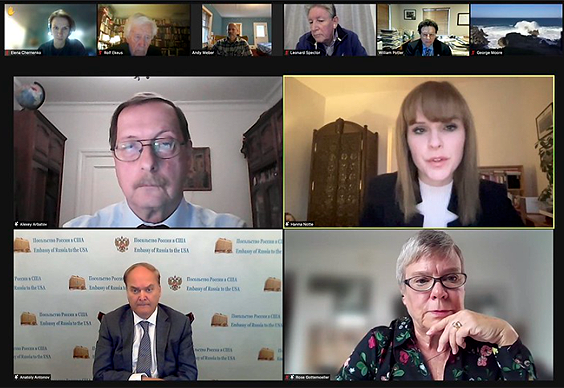November 8, 2021
High-level diplomats, current and former government officials, international civil servants, and funders joined experts at the James Martin Center for Nonproliferation Studies (CNS) for its annual International Advisory Council (IAC) meeting on October 25, 2021. The meeting was characterized by insightful discussions on the work of CNS and on critical issues faced by the international community related to the global nonproliferation regime.
Founder and Director of CNS, William C. Potter, opened the meeting welcoming more than 80 attendees from over 20 different countries. He highlighted the ability of CNS’s three branch offices (Monterey, CA, Washington D.C., and Vienna, Austria) to continue implementing their respective activities despite the challenges posed by COVID-19. Dr. Potter also welcomed the IAC’s newest member, the Honorable Rose Gottemoeller (former Deputy Secretary General of NATO and Under Secretary of State). Following Dr. Potter’s opening remarks, Middlebury President Laurie Patton applauded the work of CNS and extended her warm greetings to IAC members and other participants.
The meeting consisted of four substantive sessions: The Future of US-Russian Nuclear Relations; Private-Public Sector Collaboration in the Application of Open Source Tools to Nonproliferation Analysis; What to Expect at the 10th NPT Review Conference; and The Impact of Cyber Operations on US-Sino-Russian Strategic Relations.
The Future of US-Russian Nuclear Relations
The first IAC session focused on the future of US-Russian nuclear relations. It featured prepared remarks by Russian Ambassador to the United States Anatoly Antonov, the Honorable Rose Gottemoeller, and Academician Alexey Arbatov (head of the Center for International Security at the Primakov National Research Institute of World Economy and International Relations). The panel discussion was moderated by Senior Research Associate Dr. Hanna Notte of the Vienna Center for Disarmament and Nonproliferation (VCDNP).
Panelists shared their assessments of US and Russian approaches to, and objectives in the ongoing Strategic Stability Dialogue, converging in a characterization of the talks as productive, professional, and substantial. Ambassador Antonov elaborated on Russia’s desire to consider the nexus between offensive and defensive arms in a future agreement (or several agreements), including hypersonic and other high-precision non-nuclear weapons. Academician Arbatov built on those remarks, offering proposals for concrete measures and limitations in such a “new security equation.” Rose Gottemoeller, who was formerly Ambassador Antonov’s US counterpart in the New START negotiations, emphasized the presently heightened US focus on China, including on the Chinese nuclear build-up, in the discussion and cautioned that the future of US-Russian nuclear relations should be assessed within that broader context.
Private-Public Sector Collaboration in the Application of Open Source Tools to Nonproliferation Analysis
CNS Deputy Director Jessica Varnum, who leads CNS’s corporate partnership program, moderated the second session on “Open Source Tools,” which featured a joint presentation by Dr. Jeffrey Lewis (CNS East Asia Program Director) and Ms. Anne Pellegrino (Communications Lead for News Programs at Planet). Ms. Pellegrino provided an overview of her work with journalists and researchers to incorporate satellite imagery into their reporting on a wide range of topics, from breaking news nonproliferation events to monitoring the effects of climate change. In the context of CNS’s close partnership with Planet, both discussed their teams’ joint work uncovering more than 100 intercontinental ballistic missile silos in the Chinese desert, as featured in the Washington Post. Dr. Lewis shared other open source discoveries made by the CNS team over the past year with the help of other CNS corporate partners, including OmniSci, L3Harris, and Capella Space, some of which are profiled in an August 2021 Economist cover story on how open source intelligence can challenge governments’ monopolies on information.
What to Expect at the 10th NPT Review Conference
The central question of the third session was “what to expect at the forthcoming NPT Review Conference in January 2022.” Moderated by CNS Director William Potter, the panel featured Ambassador Gustavo Zlauvinen of Argentina (NPT Review Conference President -Designate), High Representative Izumi Nakamitsu (UN Office of Disarmament Affairs Under-Secretary-General), and Ambassador Benno Laggner (Permanent Mission of Switzerland, Vienna, Austria). Ambassador Zlauvinen emphasized the importance of process—as well as product—during the Review Conference and highlighted the need to make the conference more inclusive, including with respect to youth, industry, and civil society. His views were echoed by the other panelists, who also noted the opportunity the Review Conference provides to strengthen the norm against nuclear use and to demonstrate that the NPT remains fit for purpose. In addition, they touched upon the importance of past commitments and the priority many states place on strengthening nuclear risk reduction.
The Impact of Cyber Operations on US-Sino-Russian Strategic Relations
The fourth and final session focused on the impact of cyber operations on strategic relations involving the United States, Russia, and China. Moderated by CNS Eurasia Nonproliferation Program Director Ms. Sarah Bidgood, the session featured Mr. Leonard (Sandy) Spector (CNS Distinguished Fellow) and Dr. Elena Chernenko (Special Correspondent at the Kommersant daily newspaper). Mr. Spector offered a tour d’horizon of the implications of cyber operations against nuclear weapons systems, focusing on the stealthy nature of such attacks and the inability of states to defend themselves. He highlighted the ways in which the use of malware against nuclear command, control, and communication systems undermines deterrence, and identified its potential positive and negative consequences for arms control and nonproliferation. Dr. Chernenko, who spoke second, underscored opportunities for joint US-Russia efforts to reduce the shared threat of cyberattacks on nuclear weapons systems. While acknowledging the challenges in cooperating in this sensitive area, Dr. Chernenko pointed to a recent initiative endorsed in a joint UN resolution by Russia and the US to seek “rules of the road” to prevent malicious cyberattacks as evidence that collaboration was possible.
All of the panel sessions generated lively and thought-provoking discussion and included very active participation by the diverse group of participants. While many different views were expressed, the meeting was characterized by a common recognition of the vital role CNS plays in mitigating global proliferation threats through its programs of nonproliferation education, training, and policy-oriented research.

